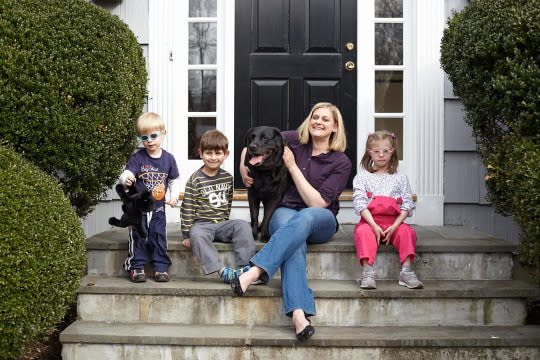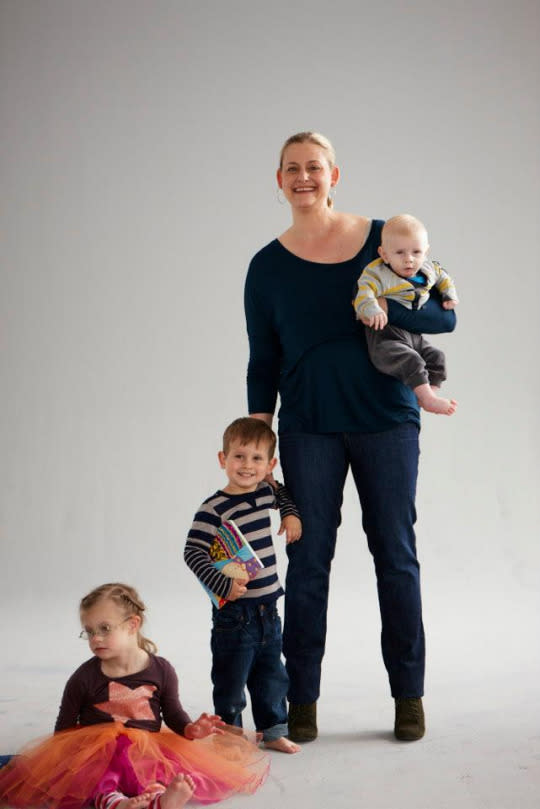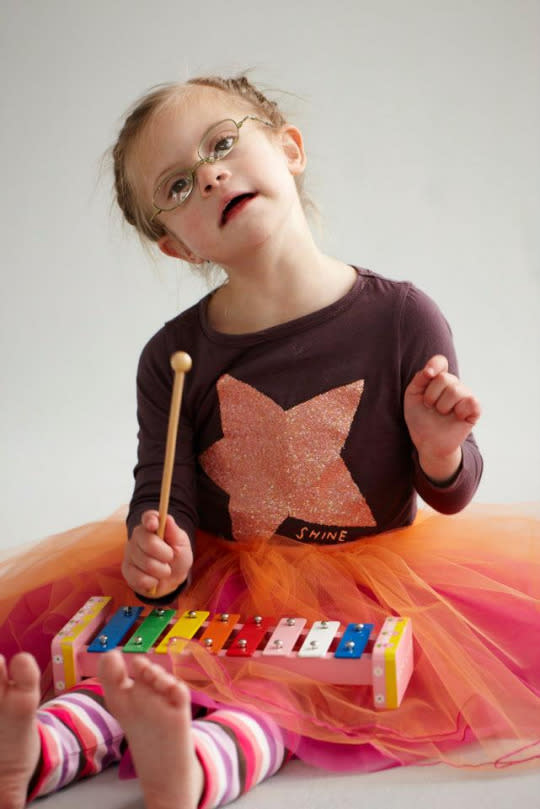What I Wish I Could Change About My Children

“I need to speak to you about your child.”
The usher looked at me with a pained expression. I nodded and stood up. I was at a dance performance in New York City with my 7-year-old daughter, Jo Jo. I glanced at my little girl, sitting expectantly in her purple-and-pink tutu, and wondered what she could have done to make him look as if he was about to go in front of a firing squad. “There have been some complaints about your daughter,” he said finally, not meeting my eyes. “People are upset. She’s making noise.”
STORY: ‘Incredible’ Way Model’s Life Changed Forever After Son’s Down Syndrome Diagnosis
I was surprised. There were moments in the performance when Jo Jo, who loves music, had gotten carried away by a scene and cheered, or burst into applause at the end of a dance. I had tried to quiet her, but didn’t think she was loud enough to be considered disruptive. “I’m so sorry,” I said. “She’s just excited; she absolutely loves the show.”
STORY: Why I Terminated My Pregnancy After Learning My Baby Had Down Syndrome
I didn’t state the next part, which seemed obvious: She has Down syndrome, and might not have always gotten the intricacies of when it was appropriate to applaud. Out of the corner of my eye, I saw Jo Jo, waiting in her seat, her arms fluttering with anticipation. I noticed people staring; some benignly, some curiously, some with overt hostility. I flinched. On the one hand, I felt strongly that Jo Jo had as much of a right to be there as anyone else. On the other hand, I didn’t want her to be exposed to their glowering for the rest of the performance.
“Can you reseat us?” I asked simply. The usher agreed to move us, out of our prime sixth-row center orchestra seats, further back towards the rear of the theater, on condition that we leave immediately if Jo Jo made any noise. I argued with him on the last part — it seemed outrageous to me that she could be kicked out for clapping — but I agreed. Sure enough, a few minutes into the performance, Jo Jo cheered and applauded at the “wrong” moment. The man in front of us turned around, shot her a dagger-like stare, and shushed her so vehemently spit from his mouth landed on her forehead.
My daughter stared at him indignantly. “You shhhh,” she said, loudly. He growled, and she gave a startled shrill yelp. The people around us began grumbling in anger. As I exited, Jo Jo, crying and protesting in my arms, I heard a woman in the row ahead of me say softly to Jo Jo’s new nemesis: “I think she has Down syndrome.” “I don’t give a damn,” the man spat out, loudly. “Even more reason for her not to be in here.”

When we walked out of the theater, Jo Jo was a tearful mess, and I was seething. I was furious that we had to leave, and that she’d been berated by an ignorant jerk who had been equally disruptive (and no one was kicking him out for it). And I felt terrible that my daughter’s little heart was broken as she sat on the floor of the lobby, sobbing in her now snot-covered tutu, wondering why she’d been forced to leave her beloved “ba-a-let.” From her perspective, she hadn’t done anything wrong.
It was a gut-wrenching moment, for both of us. And unfortunately, episodes like this, for my family, aren’t isolated incidents. Jo Jo isn’t my only child with a disability. She has two younger brothers, both of whom have their own special needs. My oldest son, Teddy, has several life-threatening food allergies, as well as a speech impediment, while my youngest son, Geoffrey, has a condition called albinism, where his body produces low levels of pigment, leaving him visually impaired. They all have vastly different issues, each carrying with them their own set of physical and mental challenges. And in the spirit of perfect honesty, I often wish none of my children had them.
Don’t get me wrong — it’s not because I don’t think my children are amazing (I do) or that I’m bitter about their special needs because it makes my life harder. Truthfully, I think parenting children with such divergent disabilities has only been good for me as a mother: It’s taught me to cultivate patience and perspective and to delight in their accomplishments, no matter how large or how small. But the reality, however trite it may sound, is that life is hard. People are cruel. No matter how ambitious, determined, and perseverant you are, the harsh truth is that the world is still much more tolerant of those without any “issues.” If there’s one thing the last seven years of parenting has taught me, it’s that while we’ve made great strides with disability rights, we still live in a culture whose acceptance is based conditionally on how seamlessly these individuals blend into society.
Jo Jo is, of course, the ultimate example. One of the first things I get asked is whether or not she’s “high-functioning,” a question that I always grapple to answer. If I answer it truthfully — that she’s not performing anywhere near grade level, but she’s still reading and mastering very basic math concepts — there’s always a moment of uncomfortable silence. It saddens me that there’s a huge dividing line separating the kids who are “cognitively capable” versus the kids who aren’t, even within the Down syndrome community. It’s no accident that “Born This Way,” A&E’s latest reality TV show about seven adults with Down syndrome, features individuals who are highly verbal; hold jobs; have serious relationships; and have big-scale dreams, like being a producer or a rap star. Those who are not as verbal, or who are battling dual diagnoses — like also having autism or ADHD — that make them appear less capable, are often pushed to the sidelines.

Take the case of Ethan Saylor, a 26-year-old man with Down syndrome who died two years ago at the hands of three off-duty county sheriffs after he refused to leave a movie theater. It took months for there to be a public outcry, even among national disability organizations. It seemed perhaps that Ethan — obese, prone to angry outbursts, and reportedly with an IQ of only 40 — did not fit into the National Down Syndrome Society’s motto of “we’re more alike than different.”
Then there’s my 6-year-old middle child, Teddy, with his life-threatening food allergies, including nuts, and a speech impediment. I will never forget the day he came home from preschool in tears, devastated because his teacher had refused to allow him to eat a birthday cake brought in for his classmate. He got grapes to eat instead. (“Well, we just didn’t think of it,” the nursery school director admitted when I called, irate, demanding to know why they hadn’t given me the option of providing nut-free alternative.) Other kids teased him for his speech problems, so poor Teddy became anxious and withdrawn. His teacher, rather than trying to figure out ways to coax Teddy out of his shell, told me she thought Teddy had Asperger’s, then antisocial personality disorder, and then, finally, “there’s just something wrong with him.” (Fed up, we switched him to another preschool, where he was fine.)
This fall, to maintain his speech therapy, his elementary school had to do a battery of cognitive and speech evaluations. It turns out that all the “issues” his first preschool teacher had flagged as problematic — the social awkwardness, the perfectionism, the intense and almost obsessive interest in certain topics — were all signs of an exceptionally intelligent little boy, something that had gone unrecognized for years due to his social anxiety and stammering.
Geoffrey, the baby of the bunch, was diagnosed with albinism at 4 months old. It was devastating to learn he was legally blind. It was also disconcerting that all of the eye specialists we saw made a point of distinguishing his disability from Jo Jo’s. They all had different prognoses about Geoffrey’s vision, but were in agreement on one thing: People with albinism were uber successful, uber determined, and uber bright. One doctor actually insisted on drawing me a bell-shaped curve of IQ scores to belabor the point. “Your daughter is someplace around here,” he said pompously, jabbing with his pen at the paper all the way to the left, while I cradled a sleeping 5-month-old Geoffrey in my arms at the time, “and your son, well,” he said, tapping his pen far right, “this is where he’ll end up.” (I was so horrified by his assumption that Geoffrey was automatically eligible for Mensa, while Jo Jo’s intelligence was somewhere in the realm of a raw carrot, that I left his office immediately.)
Geoffrey has actually taken his albinism in stride. His eyesight seems to be better than many other kids with the same diagnosis, and he has amazing compensatory skills. Most people, when they watch him running around the playground, are shocked to learn that he’s got a vision impairment. Even at 4, he’s incredibly engaging, the perpetual jokester who is able to charm his preschool classmates and teachers. But as his mom, I’m well aware of the fact that most of his clowning occurs when he’s trying to cover up the fact that he’s having trouble doing something, such as tracing his name or drawing a person — something which most other children his age can do. He’s a bright, perceptive kid who has figured out that others see his vision issues as weaknesses, and as a result, unfortunately, tries to hide them as best he can.
Thankfully, there’s research going on now that may help all of my kids. The pharmaceutical company Roche is studying the drug Basmisanil, which may boost cognitive function in kids and adults with Down syndrome. Researchers are conducting studies to see whether giving people with albinism doses of the neurotransmitter dopamine improves their vision. In a couple of years, I may be able to enroll Teddy in a clinical trial that can help him overcome his nut allergy, through an approach known as oral immunotherapy.
Some parents criticize these treatments, saying that by looking for “cures,” we’re not accepting our kids unconditionally for who they really are. But in a world where my daughter is dismissed — even by members of her own community — for not being verbal or cognitively astute enough; where my eldest son comes home from school in tears after being taunted by another classmate in the lunch line who cruelly mocked him for “t-t-t-alking like a baby;” and where my smallest son cries and fakes illnesses to get out of swim class because he doesn’t want to admit that the reflected light of the water hurts his eyes and makes it harder for him to see, I view treatments like these as the only way to level the playing field.
We live in a country, after all, where the leading Republican candidate can mock a journalist for his obvious disability and not lose any ground in the polls. Just recently, the president of the National Educational Association ranted about diversifying curriculum instruction to meet the needs of “the blind, the hearing impaired, the physically challenged, the gifted and talented, the chronically tarded and the medically annoying.” She later issued an apology and sais she was joking, but I didn’t find her comments funny. My kids fit virtually every single category on her list. It’s tragic, especially since some of the biggest issues others seem to want to “fix” with my kids are things that I actually think are the most wonderful.
After the dance recital incident with Jo Jo, I decided to speak with a behaviorist who specializes in working with kids with disabilities. I asked her what, if anything, I could have done differently during the performance. She said exactly what I’d been thinking: “Your daughter didn’t do anything wrong.”
Fortunately, a couple weeks later, Jo Jo finally got to applaud to her heart’s content at the Boston Ballet’s The Nutcracker. I was hesitant to go after our last experience, but my mother was insistent, pointing out that Boston Ballet itself has an amazing dance program for people with disabilities. So the three of us — Jo Jo, her Nana, and myself — went, accompanied by two of Jo Jo’s favorite Barbie ballerina dolls. We sat in fifth-row orchestra seats, as Jo Jo clapped, gave sporadic soft cheers, and occasionally bobbed her Barbies up and down in exact time to the music, like conductors’ batons. The first few times, my mom and I shushed her. Then I felt a tap on my back. I turned around, grimly expecting to be reprimanded, but the elderly couple behind me was beaming. “You don’t need to shush her,” the woman said. “We’re getting a kick out of how much she’s enjoying the performance.”
I mouthed, “Thank you” and settled back into my seat, as Jo Jo snuggled in my arms, grateful that at least for the next 90 minutes, she could be her own sweet self, without judgment, rather than what society expects her to be.
(Photos: Courtesy of Hallie Levine)
Please follow @YahooParenting on Facebook, Twitter, Instagram, and Pinterest. Have an interesting story to share about your family? Email us at YParenting (at) Yahoo.com.
